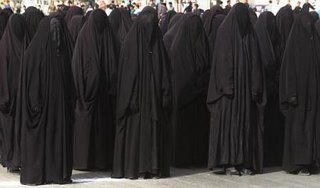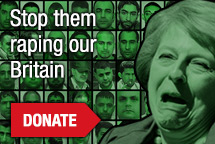Here are six reasons for a burqa ban.

1. The burqa can hide evidence of abuse
In countries such as Afghanistan, Pakistan, and Saudi Arabia where it’s common for Muslim women to wear the burqa, there are high rates of domestic violence.
87% of women reported experiencing domestic violence in Afghanistan; in Pakistan, the rate is even higher.
2. Women who don’t wear the burqa are at risk
There is an increasing amount of sexual assaults on non-Muslim women by Muslim men in Europe.
Often, the women who don’t wear the burqa are perceived to be ‘whores’.
Allowing women to wear the burqa is divisive because it separates women into two categories.
In the minds of some Muslim men, women who wear the burqa are ‘good’, and those who don’t wear the burqa are ‘bad’.
Koran 33:59
“O Prophet, tell your wives and your daughters and the women of the believers to bring down over themselves [part] of their outer garments. That is more suitable that they will be known and not be abused.”
3. The burqa can have a dehumanising effect
Dictionary definition of individuality:
The character of a particular person that distinguishes them from others of the same kind, especially when strongly marked.
In other words, people are recognisable through their characteristics such as their face and their clothes.
If everyone dressed the same and hid their faces, then people would no longer have any individuality.
Robbing people of their individuality and identity is dehumanising.
4. The burqa and public participation
There is a link between the burqa and low civic participation of women.
For example, in Afghanistan, there are female-only polling stations.
Furthermore, in Saudia Arabia and some parts of Pakistan, women are prevented from voting.
The burqa is designed to impede public interaction outside the home.
Extending civic participation to women is a fundamental feature of a modern secular society.
The burqa is a public declaration that women are unequal.
5. A burqa is a tool of oppression
Opponents of a burqa ban often say that Muslim women should be free to wear whatever they like because of religious freedom.
That liberal view came under pressure when videos and photos emerged of women in the liberated Syrian city of Manbij burning their burqas.
How many Muslim women in Britain would also like to get rid of their burqas?
6. The burqa ban in France and Austria
On the 1st October 2017, Austria’s ban on full-face Muslim veils in public spaces came into effect.
In 2014, the European Court of Human Rights (ECHR) upheld France’s burqa ban.
The ECHR accepted France’s argument that the ban encouraged citizens to ‘live together’.
The French government successfully argued that the prohibition applied to any covering of the face in public, especially hoods and balaclavas, and helmets when not worn on a motorbike.
The British National Party (BNP) will ban the burqa
The BNP believes that the act of concealing the face is a threat to the public’s safety.
However, the BNP agrees with the French government that there are occasions when it is acceptable to wear a face covering such as in adverse weather conditions, riding a motorbike or using safety equipment.


